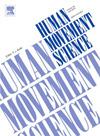同心运动引起的肩部疲劳会损害健康年轻人的本体感觉,但不会影响运动控制或表现。
IF 1.9
3区 心理学
Q4 NEUROSCIENCES
引用次数: 0
摘要
目的:研究同心疲劳对健康青壮年本体感觉、运动控制和肩部表现的影响:研究同心疲劳对健康年轻人肩部本体感觉、运动控制和表现的影响:设计:重复测试实验设计:参与者:20 名健康成年人:用关节复位感(JRS)和被动运动检测阈值(TTDPM)评估运动感觉。运动控制能力通过Y型平衡上四分之一测试(YBT-UQ)进行评估,运动能力则通过运动肩测试(ASH测试)进行评估。所有测试均在疲劳干预之前和之后立即进行(CON/CON 方案):结果:疲劳后,绝对角度误差(AAE)显著增加了 160.27%。此外,疲劳后 TTDPM 也明显增加(48.41%)。此外,疲劳干预前后的运动控制和表现没有明显差异:由于肌肉疲劳会对肩部本体感觉产生负面影响,因此有必要在疲劳前后对本体感觉进行评估,以发现疲劳可能导致的任何功能障碍。为了解决这些功能障碍,建议在疲劳状态下进行本体感觉练习,以提高机械感受器的灵敏度。本文章由计算机程序翻译,如有差异,请以英文原文为准。
Concentric exercise-induced fatigue of the shoulder impairs proprioception but not motor control or performance in healthy young adults
Objectives
To investigate the effect of concentric fatigue on proprioception, motor control and performance of the shoulder in healthy young adults.
Design
Test-retest experimental design.
Setting
Human performance laboratory.
Participants
20 healthy adults.
Main outcome meausure(s)
Proprioception was assessed using the joint repositioning sense (JRS) and the threshold to detection of passive movement (TTDPM). Motor control was assessed using the Y-balance Upper Quarter test (YBT-UQ) and performance using the Athletic Shoulder test (ASH test). All tests were conducted before and immediately after fatigue intervention (CON/CON protocol).
Results
Following fatigue, absolute angular error (AAE) was significantly increase by 160.27 %. Moreover, there was a significant increase (48.41 %) in TTDPM after fatigue. Furthermore there was no significant differences in motor control and performance before and after fatigue intervention.
Conclusions
Since muscular fatigue negatively affects shoulder proprioception, it is essential to assess proprioception before and after fatigue to detect any dysfunctions that may arise as a result of fatigue. To address these dysfunctions, it is recommended to engage in proprioceptive exercises under situations of fatigue in order to enhance the sensitivity of the mechanoreceptors.
求助全文
通过发布文献求助,成功后即可免费获取论文全文。
去求助
来源期刊

Human Movement Science
医学-神经科学
CiteScore
3.80
自引率
4.80%
发文量
89
审稿时长
42 days
期刊介绍:
Human Movement Science provides a medium for publishing disciplinary and multidisciplinary studies on human movement. It brings together psychological, biomechanical and neurophysiological research on the control, organization and learning of human movement, including the perceptual support of movement. The overarching goal of the journal is to publish articles that help advance theoretical understanding of the control and organization of human movement, as well as changes therein as a function of development, learning and rehabilitation. The nature of the research reported may vary from fundamental theoretical or empirical studies to more applied studies in the fields of, for example, sport, dance and rehabilitation with the proviso that all studies have a distinct theoretical bearing. Also, reviews and meta-studies advancing the understanding of human movement are welcome.
These aims and scope imply that purely descriptive studies are not acceptable, while methodological articles are only acceptable if the methodology in question opens up new vistas in understanding the control and organization of human movement. The same holds for articles on exercise physiology, which in general are not supported, unless they speak to the control and organization of human movement. In general, it is required that the theoretical message of articles published in Human Movement Science is, to a certain extent, innovative and not dismissible as just "more of the same."
 求助内容:
求助内容: 应助结果提醒方式:
应助结果提醒方式:


